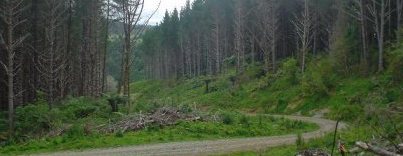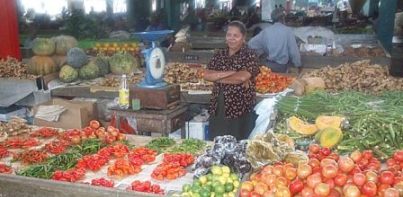EMAIL MINING
The other week you probably got a couple of "stop Pascua Lama mine" petition emails in your inbox. The mining operation requires that an area of "glacier" be disturbed in Valle de San Felix, Chile. According to the email watercourses, land, and locals will be plundered. Not overly surprising, because mining is generally bad. But gold is widely recognised as good. Therein lies the problem. The Chilean Government has approved the mine. Grist Magazine had an article last week about the campaign to stop it. It covers the impact of email campaigning (read "viral marketing") - but not to the extent that a raft of hoax campaign commentators do. A key point made by hoax-slayer is that email petitions can be counter-productive: people sign then consider that they've done enough (much the same as a criticism of recycling that I've written about before). As the Grist article points out: "...this is a local fight".
The Chilean Government has approved the mine. Grist Magazine had an article last week about the campaign to stop it. It covers the impact of email campaigning (read "viral marketing") - but not to the extent that a raft of hoax campaign commentators do. A key point made by hoax-slayer is that email petitions can be counter-productive: people sign then consider that they've done enough (much the same as a criticism of recycling that I've written about before). As the Grist article points out: "...this is a local fight".
So the challenge then becomes finding more meaningful ways of lending support. Finding and supporting individuals and organisations who have a local presence. Or at least whose voice is more likely to be heard - in this category are Mining Watch of Canada. "Supporting local solutions" has been increasingly vocalised in the aid and development sector since the neo-colonialism argument erupted during the cold war. It applies here too.
It's an interesting twist on the "think global act local" mantra. At the core of the issue is consumer demand for products that use mined material. So lets be honest and realistic. Is it possible to stop using mined material? Not soon. Is it reasonable to stop the mine? Maybe, but probably not from NZ. Is it important to ensure mining companies mine responsibly? Hell yes!
My reasoning may illustrated by way of example. Here in NZ the high impacts of one looming coal mine are being highlighted by Save Happy Valley. Anyone with half an eye on local media knows about it. And there it is on their website - you can do something direct about it. Pascua Lama is not a valid individual concern if you (as a Kiwi) are not informed about Happy Valley.
If Mining Watch are as successful as the International Rivers Network were in supporting local efforts to lower the social and environmental impact of large dam construction, you should get behind them. If they're worth their salt they'll be active in Valle de San Felix. If not then get your bones to Chile. Regardless, you'll be more informed if you consider Happy Valley.
Thursday, June 22, 2006
TIIIIMBERRRR!
If you have 240,000 Ha. of forest on your shopping list or a cool $1.35bn in your pocket the chances are you've heard from Graeme Hart in the last few weeks. Harts' Rank Group is about to go to market with the former Carter Holt Harvey forest estate it purchased earlier this year. Aside from being the biggest forestry land deal in NZ history it offers some insight into the NZ Governments' climate change policy dithering. One of the key reasons we will have a deficit to make up on the international carbon market is that the rate of forest replanting has fallen dramatically since 1990. There are fewer trees to hold our increasing fossil fuel emissions - which we committed to doing in ratifying the Kyoto Protocol.
Aside from being the biggest forestry land deal in NZ history it offers some insight into the NZ Governments' climate change policy dithering. One of the key reasons we will have a deficit to make up on the international carbon market is that the rate of forest replanting has fallen dramatically since 1990. There are fewer trees to hold our increasing fossil fuel emissions - which we committed to doing in ratifying the Kyoto Protocol.
A drive through the central North Island reveals all. Vast areas of former forest land are being made over to pasture. Not surprising, since Govt. forest policy includes the imposition of a financial penalty on land conversion from the end of 2007. This is a key cause of the presently high land conversion rate. Harts massive sale makes sense as bidders will have (just) enough time to consider their options prior to the penalty deadline.
Because Rank Group also owns timber processing facilities there will be tie-ins for forest buyers in order to maintain a steady supply of wood. This does little for the fact that the world is so goggle-eyed-thirsty for our milk products that the land price pressure for conversion of forest land to dairy will remain in the immediate term. Climate policy must consider this in adequately recognising the quick-fix potential of forest sinks. Forest industry representatives have been clear in their dislike of policy proposals so far - including the de-forestation penalty.
The risk is of course that rather than being a potential short-medium term solution to the NZ Kyoto deficit, the Hart/Rank sale may well lead to exacerbation of it. With an eye to land use dynamics, it appears that in terms of greenhouse gas accountability, the dairy sector is passing the buck to forestry. With the 2007 de-forestation penalty looming, Hart is reducing exposure to risk of future land use inflexibility.
Although forestry has the potential to be a catalyst for a carbon neutral NZ, it is our consumption habits that are the core cause of fossil fuel emissions. Can Government create the incentive environment for a vibrant forestry industry? Will a they send a message to consumers with some form of carbon tax? The coming climate change policy release will be interesting...
More about: climate change, forestry, land use
Posted by
mikeymike
at
12:17 pm
0
comments
![]()
Friday, June 16, 2006
NEXT PLEASE...! The "business of sustainability" is indeed a rampant media topic at the moment. I've written a number of threads (here and here most recently) offering the odd thought on some interesting business sustainability press. It really does seem that a whole raft of big businesses are checking themselves into the sustainability clinic.
The "business of sustainability" is indeed a rampant media topic at the moment. I've written a number of threads (here and here most recently) offering the odd thought on some interesting business sustainability press. It really does seem that a whole raft of big businesses are checking themselves into the sustainability clinic.
In the last month a whole bunch of large businesses in the UK and in the US have gone direct to their Governments and asked for stricter fossil fuel emissions controls. Yes you've read me right. Business has asked Govt. to intervene. Hark! Libertarians at the ready!
At the March Climate Change and Governance conference in Wellington a clear message was sent: set a price for carbon and business will know which way to head. This is the exact sentiment of the UK/US big business submissions. In particular, businesses want to know which technology options to pursue. The bottom line seems to be that business wants to take the plunge but is being hampered by an opaque policy environment.
An article in the Economist states the case clearly: that "climate change creates real business risks and opportunities". According to the Economist, the risk of rising energy costs is the most pressing - this is of course as much geo-political risk as environmental or even regulatory risk, but it is risk all the same.
The concluding paragraph of the Economist article hints at the logical conclusion of the move by big business towards sustainability. Up to half of company value is at stake if firms fail to take climate action. Shareholder value is what drives corporate decisions (for better or worse), and when statements like "a halving of value" are bandied about, those at the board room table are bound to take note.
Of course this applies to small business as much as the monsters. The major British building services advocacy group is running the "100 Days of Carbon Cleanup" campaign - where the BBC is covering the weekly efforts of one particular firm. Although it's heavily energy focused it makes for interesting reading. I cant help but think that the NZ Sustainable Business Network's Get Sustainable Challenge is a more convincing initiative. Its a very simple and practical means of bringing sustainability into your business. I suggest you take a look at it...
With all this press, and all of these initiatives, are we finally seeing a sea-change? I suspect so!
More about: business, climate change
Posted by
mikeymike
at
2:06 pm
0
comments
![]()
Monday, June 12, 2006
DOWN TO YOUR LOCAL
A few weekends back I caught a public notice placed in the DomPost by Moore Wilson. They were after stall holder expressions of interest for a farmers market in Porirua. Fantastic! A local farmers market is a very real means of re-establishing vibrancy in the local produce market. They not only strengthen community links, but also ensure a greater degree of local consumer revenue reinvestment. They're a more sustainable alternative to large retail outlets who insist on trucking fruit and veg the length of the country. This article outlines how one farmer has been able to retain control of sales and ensure quality through running a stall at the Hawkes Bay farmers market. An article in today's DomPost provides a broader picture in highlighting a farmers market resurgence - possibly as "a backlash against the supermarket ownership duopoly" which I have written about previously. A national network of markets is aided by the Farmers Market NZ Assn. - who provide advocacy and regulatory guidance for new and existing markets. One assumes that Moore Wilson and FMNZA are collaborating on the Porirua proposal.
This article outlines how one farmer has been able to retain control of sales and ensure quality through running a stall at the Hawkes Bay farmers market. An article in today's DomPost provides a broader picture in highlighting a farmers market resurgence - possibly as "a backlash against the supermarket ownership duopoly" which I have written about previously. A national network of markets is aided by the Farmers Market NZ Assn. - who provide advocacy and regulatory guidance for new and existing markets. One assumes that Moore Wilson and FMNZA are collaborating on the Porirua proposal.
A little research revealed that a fellow Wellington blogger discussed the concept in broad terms only a month ago. He expressed a desire to see a farmers market in the CBD. Not likely. Well, not a comprehensive, dynamic farmers market at least.
Farmers markets traditionally operate on weekends only - and some only monthly. For a dynamic farmers market to fly in the Wellington CBD an exceptionally versatile building would have to be found/built that would not otherwise be used on weekends. Unfortunately existing weekend uses are the bread and butter for most public buildings. Land values and rents are simply too high for a Wellington CBD farmers market to be viable as a stand alone entity. It would be fantastic to see one in the CBD - and if you've been to Suva you'll know of a pretty good example of how it can work.
Land values and rents are simply too high for a Wellington CBD farmers market to be viable as a stand alone entity. It would be fantastic to see one in the CBD - and if you've been to Suva you'll know of a pretty good example of how it can work.
Unfortunately the small fruit and veg market at the Willis-Vivian corner is an anomaly, the weekend market on Wakefield St is getting the sqeeze from other "waterfront" uses, and the existing Saturday Porirua vegie market is a fair-weather-early-bird affair.
Aside from a clever property-share arrangement, the only viable Wellington CBD (almost!) option would seem to be subsidised use of land at somewhere at Centreport or the rail yards. Centreport are clearly heading in a more commercial direction, leaving WCC-Ontrack negotiation for use of the rail yards the only forseeable prospect.
No wonder Moore Wilson went for a Porirua location. And good on them for taking the plunge. I hope we'll be able to get to it from a railway station...
More about: business, community, food, sustainable shopping, Wellington
Posted by
mikeymike
at
12:05 pm
2
comments
![]()
Thursday, June 08, 2006
RETAIL MADNESS
Am I so detached from reality as to not comprehend what happened with the opening of Sylvia Park shopping centre today? I'm reminded of the impeccable Modest Mouse: "...when the earth folded in on itself..." What were people thinking? The Herald, Frogblog, Scoop/Transit, and a raft of other reports on the opening are plain evidence that malls are for the most part ridiculous. Were the masses attracted by cut price goods? Was it the chance to be the first to gorge at a brand new leisure facility? Or were punters simply keen to get out on the road and check out a massive selection of stationary cars?
The Herald, Frogblog, Scoop/Transit, and a raft of other reports on the opening are plain evidence that malls are for the most part ridiculous. Were the masses attracted by cut price goods? Was it the chance to be the first to gorge at a brand new leisure facility? Or were punters simply keen to get out on the road and check out a massive selection of stationary cars?
Thumb through the current North and South and you'll find a particularly interesting article on the mall phenomenon. It covers the gamut: a mum who brings her kid up in a mall, teens who get a sense of neighbourhood from one, credit card schtuk, and even a hair in a bun retail fiend who "visit[s] a different mall every day to explore Auckland." Bloody'ell.
An earlier thread I wrote lamented the negative impact of large format retail on the local economy and community. Unfortunately I don't have any local knowledge to put this in a Mt Wellington context, but the North and South article quotes an Auckland retail consultant: "it's a transfer of community control to corporate control, with profits going almost always overseas to shareholders who don't care about the locals."
Maybe the world IS folding in on itself. Or Mt Wellington is at least. The critics of my perspective will of course scream "typical anti-consumer would rather see us all living in caves". Of course consumers have choice, but where's the sense in following an economic model that lets business ignore negative externalities?
It's not about big business being bad. Its about some big business doing business badly. Kiwi Income Property Trust - the owners of Sylvia Park (and, incidentally, Northlands which I alerted to in the earlier thread) are in the business of getting people in cars and debt (as are many other large format retail proponents). Direct business impacts such as traffic jams, paved paradise, and Mastercard bills are clearly foreseeable. To me these are indicators of bad business.
So long as the likes of KIPT serve up the punters, shops will be happy in their not so little mall cocoon. Retailers need a good reason to consider the big picture: "how does 'how we do business' impact our community?" A healthy community means healthy bottom lines. And visa versa. The little picture can be fudged to satisfy a 2, 5, or 10 year investment horizon, but only a big picture conception will address the needs beyond... Is that a call for ShoppingFix I hear?
More about: business, land use, sustainable shopping, transport
Posted by
mikeymike
at
8:58 pm
0
comments
![]()
Friday, June 02, 2006
WEIRDO GOES BUSH
Bring on the looooong weekend! And of course bring on this Wednesday night when we're holding our first fundraiser. Our Grizzly Man screening at the Paramount sold out in a few days so we're left wondering whether we should have booked the main screen... Never mind. It will be a great evening all the same. If you've not paid for or picked up your ticket you need to be sharp. Paramount need our cash the day before the screening. Our contact email is listed on the ShoppingFix website. Chop chop.
If you've not paid for or picked up your ticket you need to be sharp. Paramount need our cash the day before the screening. Our contact email is listed on the ShoppingFix website. Chop chop.
And if you didn't do it the other week, remember to say "happy birthday Queenie" on Monday. She's not such a bad old duck - givin' us a day off an' all. See you Wednesday!
More about: nature, ShoppingFix
Posted by
mikeymike
at
9:43 am
0
comments
![]()
Thursday, June 01, 2006
EASY, OH SO EASY...
I'm usually one for good news. Last month the New York Times ran "The Business of Green" special. On the whole an impressive array of topics were covered (from architecture to Zilkha, a renewables co. bought by Goldman Sachs). But... The problem was that I got stuck on two articles that take a look at green marketing. The first, a rather tacky exercise in name dropping, achieves little other than consumption of column inches (I assume it went to print). When a reporter uses a whole lot of big names to conclude that a green image helps sell product, you start to wonder who reads the NYT these days (kinda like those NZ Army ads in busses at the moment - talk about "lowest common denominator").
The problem was that I got stuck on two articles that take a look at green marketing. The first, a rather tacky exercise in name dropping, achieves little other than consumption of column inches (I assume it went to print). When a reporter uses a whole lot of big names to conclude that a green image helps sell product, you start to wonder who reads the NYT these days (kinda like those NZ Army ads in busses at the moment - talk about "lowest common denominator").
With the second of the troublesome articles comes the SLAP! Environmental standards is a subject close to my heart. This article approaches sustainable building from a certification perspective, and mentions that property developers often market standards with little substance. The reporter then endorses an architect laying claim to having recently coined the term "greenwash". Either NYT ran these two pieces as training for some newbies, or the general readership is indeed daft.
The term "greenwash" is clearly not new. To falsely claim an environmental ethic through press or marketing. The Wikipedia entry has a link to a 2005 publication precis by The Green Life which names the top10 US greenwashers. The usual lineup of motor and oil industry names plus a few surprises. One surprise, the National Ski Area Assn, calls for a closer look. I think I'll have to have a wee local dig before the season kicks off...
I'm rambling now. All I wanted to say was that here we are, we're not silly, and despite what NYT may espouse, it can be easy being green. Especially with a tool like ShoppingFix!
Posted by
mikeymike
at
9:33 pm
0
comments
![]()


